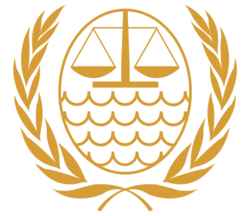International Tribunal for the Law of the Sea
 | |
The International Tribunal for the Law of the Sea (ITLOS) is an intergovernmental organization created by the mandate of the Third United Nations Conference on the Law of the Sea. It was established by the United Nations Convention on the Law of the Sea, signed at Montego Bay, Jamaica, on December 10, 1982. The Convention entered into force on November 16, 1994, and established an international framework for law over "all ocean space, its uses and resources". The tribunal is based in Hamburg, Germany. The Convention also established the International Seabed Authority, with responsibility for the regulation of seabed mining beyond the limits of national jurisdiction, that is beyond the limits of the territorial sea, the contiguous zone and the continental shelf. There are currently 167 signatories, 166 states plus the European Union.
The most noticable exception is the United States, which has not signed the treaty.
South China Sea
Despite not having signed the treaty, this has not stopped the United States from giving full legal advisory and political support[1] to the the Philippines, in an arbitration case the island nation started in 2014, to have ITLOS support the Filipino claims over the islands and reefs in the South China Sea, against those of China. Manila’s legal case was drafted and was be argued by the US law firm, Foley Hoag, which has close ties to the Obama administration[2]. China did not attend the 'arbritration' case, stating it would disregard any ruling by ITLOS that found against its claims.
Diego Garcia
On January 27, 2021, ITLOS, in the latest round in a protracted legal battle, ruled that the UK has no sovereignty over the Chagos Islands, which includes Diego Garcia, home to one of the US’s largest airbases. It follows a similar decision in 2019 when the International Court of Justice (ICJ) in an “advisory” opinion, ruled that Britain’s separation of islands in 1965 from Mauritius before it became independent in 1968 and their incorporation into the specially created British Indian Ocean Territories (BIOT), violated 1960 UN resolution 1514 banning the breakup of colonies before independence. Britain ignored the ruling, stating "Mauritius has never held sovereignty over the BIOT and the UK does not recognise its claim.”[3]